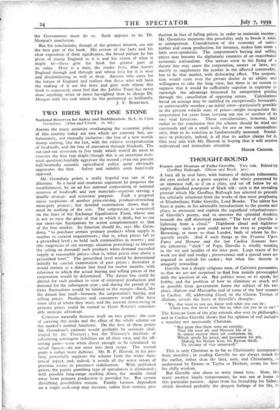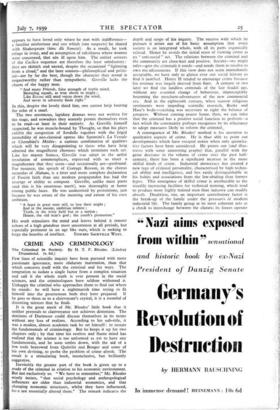THOUGHT-BOUND
A FACE all in oval lines, with features of delicate refinement, the eyes arched to a grave surprise ; the whole presented by an immense ruff, as if on a plate, and set off below by an amply dignified pourpoint of black silk : such is the revealing portrait which Mr. Geoffrey Bullough has selected to precede his scholarly selections from the works of that most perplexing of Elizabethans, Fulke Greville, Lord Brooke. The editor has been at pains, in his admirable introductions to the poems and plays, to attenuate and explain the superficial rebarbativeness of Greville's poetry, and to uncover the splendid thinking beneath the stiff rhetorical manner. " The best of Greville is lightning from a cloud." Highbrow cloud and highbrow lightning : such a poet could never be even as popular as Browning, or more so than Landor, both of whom he fre- quently recalls. And if such things as the Treatise Upon Fame and Honour and the last Caelica Sonnets have the aphoristic " click " of Pope, Greville is wholly wanting in the wit and lucidity of the later poet. Large tracts of his
work are dull and stodgy ; perseverance and a special taste are required to unlock his casket ; but what lies therein is uniquely rewarding.
Greville was a deeply religious man, of Calvinist persuasion, so that we are not surprised to find him mainly preoccupied with the question of sin. But politics were, so to speak, his hobby, and the problem of how to eliminate as much evil as possible from government forms the subject of his two plays, Alaham and Mustapha, and of some of the best sonnets in Caelica. III, addressing Good, in the Chorus Tertius of Alaham, reveals the basis of Greville's thought : " We, that were as you are, know well what you can be ; -.Nhere you, that never were like us, what can you in us see? "
The Senecan form of the play extends also over its philosophy, and in Caelica Greville shows that his opinion of evil includes a morality •not necessarily Christian.
" But grant that there were no eternity, That life were all, and Pleasure life of it, In sinnes excesse there yet confusions be, Which spoyle his peace, and passionate his wit, Making his Nature lesse, his Reason thrall,
To tyranny of vice unnatural" This is only Christian in so far as Christianity incorporates Stoic morality ; in reading Greville we are always struck by the earlier, rather than the later, note, and Christianity, as understood by Donne or Taylor or Herbert, seems far from his chilly wisdom.
But Greville also chose to write about love. Now, like many another lonely temperament, he was not at home in this particular passion. Apart from his friendship for Sidney. which involved probably the deepest feelings of his life, be appears to have loved only where he met with indifference— a familiar misfortune and one which (one suspects) he shared with Shakespeare (hint illi Soneut). As a result, he took refuge in irony, and an assumption of rakishness where women were concerned, that sits ill upon him. The earlier bonnets of the Caelica sequence are therefore the least satisfactory : they are skittish and unreal, despite the occasional " lightning from a cloud," and the later sonnets—philosophical and politi- cal—are by far the best, though the character they reveal is respectworthy rather than sympathetic. Greville lacks the
charm of the happy man.
"And many Friends, false strength of feeble mind, Betraying equals, as true slaves to might ; Like Eccoes still send voices down the wind, And never in adversity finde right."
In this, despite the lovely third line, one cannot help hearing the echo of a snarl.
The two enormous, lapidary dramas were not written for the stage, and nowadays they scarcely permit themselves even to be read—at least in their entirety. As Greville himself suspected, he was muscle-bound by Thought, so that his plays
exhibit the congestion of Sordello together with the frigid immobility of neo-classical operas like Spontini's La Vestale or Cherubini's Medee: a curious combination of qualities which will be very disappointing to those who have long admired the magnificent choruses which terminate each act.
Like his master Seneca, Greville was adept in the artful tesselation of commonplaces, expressed with so exact a magnificence that they seem—and occasionally are—profound. For instance, the speech of Corrupt Reason, in the chorus secundus of Alaham, is a finer and more complete declaration of Fascist faith than any modem propagandist has had the courage or ability to compose. Greville, unlike most poets (and this is his enormous merit), was thoroughly at home among public faces. He was undeceived by pretentious, just because he was aware of the meaning and extent of his own ambition.
" A feare in great men still, to lose their might ; And in the mean, ambition infinite ; Truth, in the witty held but as a notion ; Honor, the old man's god ; the youth's promotion."
His work stimulates the mind and leaves behind it remote echoes of a high grandeur most uncommon at all periods, but especially pertinent in an age like ours, which is seeking to











































 Previous page
Previous page